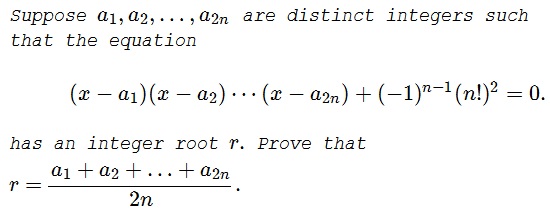An Integer Root of a Polynomial with Integer Coefficients
Problem

Solution 1
If $r$ is a root, then $r\neq a_j (\text{for}~1\leq j\leq 2n)$ and
$|r-a_1||r-a_2|\cdots |r-a_{2n}|=(n!)^2.$
All $a_i's$ are distinct; $r$ and $a_i's$ are integers. This implies that
$\small{\{r-a_1,r-a_2,\ldots ,r-a_{2n}\}=\{-n,-(n-1),\ldots ,-2,-1\}\cup \{1,2,\ldots ,(n-1),n\}.}$
Replacing any integer in the RHS set by a non-zero integer that does not belong to the set makes $|r-a_1||r-a_2|\cdots |r-a_{2n}|\gt (n!)^2$.
Thus,
$\small{\{a_1,a_2,\ldots ,a_{2n}\}=\{r-n,r-(n-1),\ldots ,r-1\}\cup\{r+1,r+2,\ldots ,r+n\}.}$
The average of the LHS set is $(a_1+a_2+\ldots +a_{2n})/(2n)$ and the average of the RHS set is $r$.
Note, $r$ is indeed a solution because
$(r-a_1)(r-a_2)\cdots (r-a_{2n})=(-1)^n(n!)^2=-(-1)^{n-1}(n!)^2.$
Solution 2
Let's note first that, for $x,k$ integers, $k\gt 0,$ the equation $|x-m|=k$ has exactly two distinct solutions: $m_{1,2}=x\pm k.$
Assume now that $x\notin\{a_1,a_2,\dots,a_{2n}\}.$ Then $\displaystyle \prod_{i=1}^{2n}|x-a_i|\ge (n!)^2.$
Indeed, as we observed, the equation $|x-m|=1$ has at most two solutions among $\{a_1,a_2,\dots,a_{2n}\};$ for all other $m$, $|x-m|\gt 1.$
Similarly, the equation $|x-m|=2$ has at most two solutions among the remaining candidates. We continue in this manner to establish $\displaystyle \prod_{i=1}^{2n}|x-a_i|\ge (n!)^2,$ for $x\notin\{a_1,a_2,\dots,a_{2n}\}.$
It follows that an integer solution $r$ of the given equation must have the property
$\{a_1,a_2,\ldots,a_{2n}\}=\{r-1,r+1,r-2,r+2,\ldots, r-n,r+n\}$
from which the conclusion is immediate.
Acknowledgment
This is problem 2 (credited to Canada) from among Olympiad Problems chapter of Arbelos (1984, v 3, n 2), a now defunct magazine published by Samuel L. Greitzer.
Solution 1 is by Amit Itagi; Solution 2 is by Leo Giugiuc.
|Contact| |Up| |Front page| |Contents| |Algebra|
Copyright © 1996-2018 Alexander Bogomolny73728679
